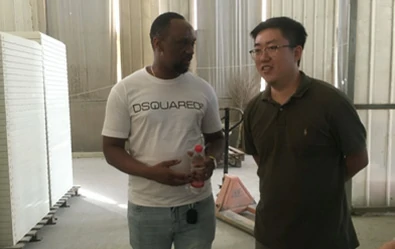loading...
- No. 9, Xingyuan South Street, Dongwaihuan Road, Zaoqiang County, Hengshui, Hebei, China
- admin@zjcomposites.com
- +86 15097380338
- Welcome to visit our website!
frp pressure vessel
Understanding FRP Pressure Vessels Engineering Marvels for Modern Applications
Fiber Reinforced Polymer (FRP) pressure vessels have emerged as a revolutionary solution in various industries, owing to their unique combination of strength, flexibility, and resistance to corrosion. These lightweight composites are increasingly being utilized in applications such as chemical storage, water treatment, and energy generation, owing to their superior performance compared to traditional materials like steel and fiberglass.
What Are FRP Pressure Vessels?
FRP pressure vessels are cylindrical containers designed to withstand internal pressure. They are constructed using polymer matrices reinforced with fibers, typically glass or carbon, which provide exceptional mechanical properties while remaining lightweight. The manufacturing methods for FRP vessels, including filament winding and hand lay-up, allow for precise control over the fiber orientation, resulting in enhanced strength and durability.
Key Advantages of FRP Pressure Vessels
1. Corrosion Resistance One of the primary advantages of FRP vessels is their inherent resistance to corrosive substances. Unlike metal vessels, which can degrade over time in harsh environments, FRP vessels maintain their integrity even when exposed to aggressive chemicals and environmental conditions. This property significantly extends the service life of the vessels.
2. Lightweight The low density of FRP materials makes these pressure vessels considerably lighter than their metal counterparts. This characteristic not only simplifies transportation and installation but also reduces the load on support structures, making them ideal for applications in remote or space-constrained locations.
3. High Strength-to-Weight Ratio Despite their lightweight nature, FRP pressure vessels demonstrate remarkable strength. The reinforcement provided by fibers allows these vessels to handle high internal pressures, making them suitable for a variety of high-stress applications.
4. Thermal Insulation FRP vessels exhibit good thermal insulation properties, which can be beneficial in maintaining the temperature of the substances stored within. This insulation capability also helps prevent heat loss, contributing to energy efficiency during processing.
frp pressure vessel

5. Customization The flexibility in manufacturing methods enables the customization of FRP vessels to meet specific industry requirements. Custom shapes, sizes, and pressure ratings can be easily achieved, ensuring that the end product perfectly suits the intended application.
Applications of FRP Pressure Vessels
FRP pressure vessels are utilized across various industries, showcasing their versatility and reliability. In the chemical industry, they are used to store aggressive solvents and acids, facilitating safe and efficient operations. In the water treatment sector, FRP vessels efficiently hold water under pressure and are crucial for processes such as reverse osmosis.
Moreover, in the renewable energy sector, FRP vessels play a significant role in storing hydrogen for fuel cells and in wind energy systems where they are used as part of the structural framework. The oil and gas industry also benefits from these vessels in offshore applications, where their lightweight and corrosion-resistant nature is vital.
Challenges and Considerations
Despite their many advantages, the adoption of FRP pressure vessels is not without challenges. The initial manufacturing costs can be higher than traditional materials, which may deter some potential users. Furthermore, the long-term behavior of these vessels under severe conditions is still a subject of ongoing research. It is essential to ensure that engineers understand the specific requirements and limitations when designing systems that incorporate FRP vessels.
Conclusion
FRP pressure vessels represent a significant advancement in materials engineering, offering numerous benefits over conventional options. As industries continue to evolve, the demand for these innovative vessels is likely to increase due to their strength, durability, and resistance to harsh environments. Properly designed and manufactured FRP vessels will undoubtedly play a crucial role in meeting the demands of modern engineering applications, paving the way for safer and more efficient industrial processes. As technology progresses, the future of FRP pressure vessels appears bright, with opportunities for further innovation and enhanced performance across various fields.
-
GRP Structures: The Future of Lightweight, High-Performance EngineeringNewsJun.20,2025
-
FRP Water Tank: High-Performance Storage for Corrosive and Clean Water SystemsNewsJun.20,2025
-
FRP Square Tube: The New Industry Standard for Chemical and Structural ApplicationsNewsJun.20,2025
-
FRP Pultruded Profiles: The Ultimate Choice for Lightweight Structural StrengthNewsJun.20,2025
-
FRP Handrails: The Safer, Smarter, and Stronger Choice for Modern InfrastructureNewsJun.20,2025
-
FRP Grating: The Smart Solution for Durable, Lightweight Industrial FlooringNewsJun.20,2025
-
Why Choose a Galvanized Water Tank for Your Storage NeedsNewsMay.21,2025
